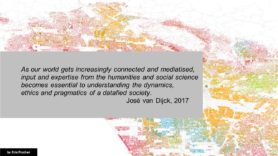Governing the Digital Society is a new focus area at Utrecht University
 One of the four newly identified focus areas at Utrecht University is Governing the Digital Society. Focus areas interdisciplinarily address research objects of societal relevance and develop novel ways of scientific inquiry. The four new focus areas will receive a total of 1,6 million Euro funding for the period September 2019 to August 2023.
One of the four newly identified focus areas at Utrecht University is Governing the Digital Society. Focus areas interdisciplinarily address research objects of societal relevance and develop novel ways of scientific inquiry. The four new focus areas will receive a total of 1,6 million Euro funding for the period September 2019 to August 2023.
Big Data and digital platforms create new economic and social opportunities, but also bring with it risks in terms of privacy, a level playing field, democratic control, autonomy and security. Data-driven practices offer opportunities for private and, above all, public sectors, but in doing so, it is important to look explicitly at how this digital society can be managed fairly and transparently. Civil rights must also be safeguarded and public values must be firmly anchored. This research area focuses on how an open society can benefit from digital developments by stimulating effective institutional innovations and how potential threats can be averted.
The complexity of issues emerging from datafication and platformization require a broad interdisciplinary approach. The more ‘big data’ affect our personal livelihoods, our culture and political institutions, the more academic disciplines must cooperate to be able to counter complex challenges.
Spearheaded by Prof. José van Dijck, Dr. Mirko Tobias Schäfer, Prof. Albert Meijer, and Prof. Anna Gerbrandy, the focus area brings together scholars from media studies, critical data studies, governance studies and law. Over the past years, they have already developed a number of successful collaborations, among others a PhD research programme with currently six projects on algorithmic governance in municipalities, tracing ethnicity in data sets, fundamental rights and social media platforms, the role of alternative social media platforms in democracies, the emergence of data monopolies in the face of competition law, and the impact of platform architecture on social infrastructures.
Considering societal impact, the group has already mounted successful and innovative projects. Since 2015, the Data School offers an experimental space for testing policy options for data-driven public management, developing new tools for data management, and for training students in applying novel methods. The DataWorkplace is a joint effort of Data School and the UU School of Governance to create an environment where research, teaching and experimental testing in practical contexts go hand in hand. The Data Ethics Decision Aid, an impact assessment for data projects developed by Data School in cooperation with Ethics Institute at UU, is already implemented at number of municipalities and other Dutch government organisations. Building on the Data School’s successful cooperation with various partners, this focus area intends to raise awareness of data issues among decision makers and representatives and to develop perspectives on governance and citizenship in the digital society.

